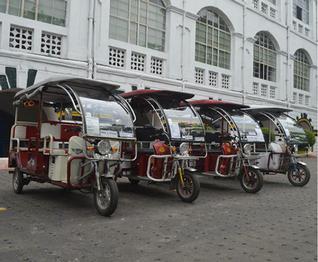
Battery-operated rickshaws, locally called ‘totos,’ are now allowed to ply in Fort William, the headquarters of Eastern Command, for civilians to commute in the 177-acre campus. The initiative has benefited those who work in the Eastern Command — both former and current employees — as they routinely visit Fort William, located on the eastern banks of the river Hooghly.
“Electronic rickshaws are immensely helpful. We had to walk a kilometre or two to reach the canteen from one of the main gates,” said Shibnath Ganguly, a retired Air Force staff and added: “It was an arduous walk, especially in the summer.” The e-rickshaws charge a subsidised rate of two rupees from each passenger for each trip.
235th anniversary
The rickshaws ply from 8 am to 8 pm inside Fort William, which completes its 235th year in 2016.
Opened in 1781, the fort, with a formidable arsenal and personnel presence, was named after William III of England. Many civilians, a few thousands in number, stay inside, while scores of employees daily report to their offices offices.“This is primarily a welfare service, not only for the benefit of the public but also for the boys who operate the rickshaws,” explains Col. Richard Fernandes, the Commanding Officer of 12 Garhwal Rifles, who ensures smooth operation of the rickshaw service. The drivers are civilians, selected by the Army, to run four such rickshaws.
“The Army has provided the e-rickshaws. The drivers are not only paid Rs.3,000 every month [by the Army] but also make additional money by providing the service to people,” said Col. Fernandes. The rickshaws are not allowed to go outside the Fort’s campus. However, that is “not a major concern” for Mritunjay Kumar, one of the drivers who covers 50-60 km every day. “I am earning about Rs. 100-150 per day and making about Rs. 8000 each month,” said 19-year-old Mr. Kumar, whose father is a civilian employee of the Army.
The officials believe that the earning of the drivers from the e-rickshaw project, promoted as “an eco-friendly” venture, will go up from localised tourism, as the Vijay Smarak [War Memorial] at Fort William was recently opened to the public.
The e-rickshaws charge a subsidised rate of two rupees per passenger per trip
source: http://www.thehindu.com / The Hindu / Home> National / by Special Correspondent / Kolkata – July 14th, 2016